El mundo que tenemos, ¿podemos mejorarlo?

Objetivos de la exposición
La exposición El mundo que tenemos, ¿podemos mejorarlo? tiene por objetivos:
- Sensibilizar a la población sobre la importancia de avanzar hacia escenarios más sostenibles, promoviendo hábitos y comportamientos que favorezcan un desarrollo sostenible.
- Cuestionar ideas preconcebidas sobre medio ambiente y desarrollo de modo que provoquen la reflexión y la capacidad de ser críticos
- Mostrar opciones alternativas eficaces de buenas prácticas ambientales.
| Exposición disponible para |
|---|
El mundo que tenemos, ¿podemos mejorarlo?
 Panel de presentación- El mundo que tenemos, ¿podemos mejorarlo?
Panel de presentación- El mundo que tenemos, ¿podemos mejorarlo?
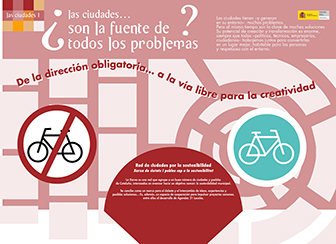 Panel 1- Las ciudades... ¿son la fuente de todos los problemas?. ¿Vemos las ciudades como un problema, o como una herramienta para convertirlas en un lugar mejor?.
Panel 1- Las ciudades... ¿son la fuente de todos los problemas?. ¿Vemos las ciudades como un problema, o como una herramienta para convertirlas en un lugar mejor?.
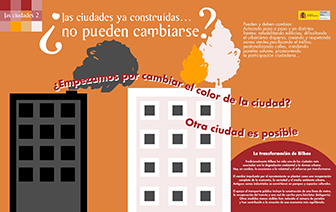 Panel 2- Las ciudades ya construidas... ¿no pueden cambiarse?. Las ciudades son estáticas o ¿tenemos que trabajar para que sean dinámicas e ir mejorando con el paso del tiempo?.
Panel 2- Las ciudades ya construidas... ¿no pueden cambiarse?. Las ciudades son estáticas o ¿tenemos que trabajar para que sean dinámicas e ir mejorando con el paso del tiempo?.
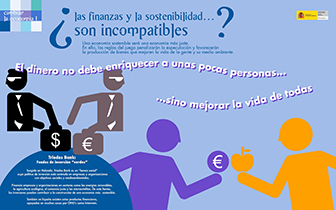 Panel 3- Las finanzas y la sostenibilidad... son incompatibles. Una economía sostenible será más justa y mejor para el medio ambiente y la vida de las personas.
Panel 3- Las finanzas y la sostenibilidad... son incompatibles. Una economía sostenible será más justa y mejor para el medio ambiente y la vida de las personas.
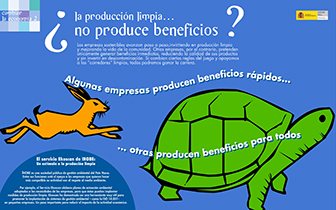 Panel 4- La producción limpia... ¿no produce cambios?. Las empresas sostenibles son más rentables, puesto que no sólo generan beneficios económicos, si no sociales y ambientales.
Panel 4- La producción limpia... ¿no produce cambios?. Las empresas sostenibles son más rentables, puesto que no sólo generan beneficios económicos, si no sociales y ambientales.
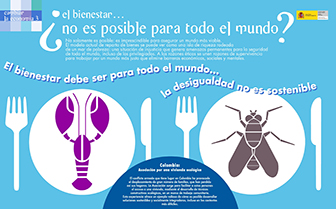 Panel 5- El bienestar... ¿no es posible para todo el mundo?. Hay que intentar repartir la riqueza con todos, no podemos vivir en un mundo con unas diferencias tan grandes.
Panel 5- El bienestar... ¿no es posible para todo el mundo?. Hay que intentar repartir la riqueza con todos, no podemos vivir en un mundo con unas diferencias tan grandes.
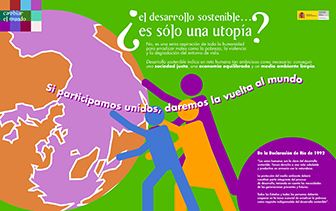 Panel 6- El desarrollo sostenible... ¿es sólo una utopía?. El desarrollo sostenible debe ser un reto para la humanidad tan ambicioso como otros; una sociedad justa, economía equilibrada...
Panel 6- El desarrollo sostenible... ¿es sólo una utopía?. El desarrollo sostenible debe ser un reto para la humanidad tan ambicioso como otros; una sociedad justa, economía equilibrada...
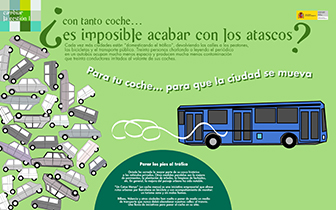 Panel 7- Con tanto coche... ¿es imposible acabar con los atascos?. Hay que dar una vuelta al modo que tenemos de desplazarnos, ¿no será mejor devolver las calles a los peatones...?
Panel 7- Con tanto coche... ¿es imposible acabar con los atascos?. Hay que dar una vuelta al modo que tenemos de desplazarnos, ¿no será mejor devolver las calles a los peatones...?
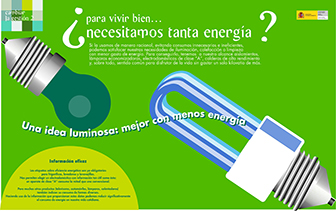 Panel 8- Para vivir bien... ¿necesitamos tanta energía?. El ahorro y el uso de tecnologías más eficientes podrán hacer que la humanidad consuma menos recursos, ¿lo ponemos en práctica...?
Panel 8- Para vivir bien... ¿necesitamos tanta energía?. El ahorro y el uso de tecnologías más eficientes podrán hacer que la humanidad consuma menos recursos, ¿lo ponemos en práctica...?
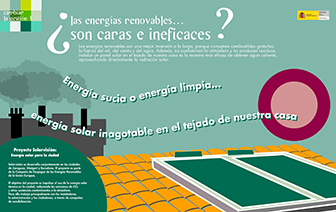 Panel 9- Las energías renovables... ¿son caras e ineficaces?. Nuestro sistema energético ¿es el mejor modelo, es el más limpio?... ¿te parece que lo repensemos?
Panel 9- Las energías renovables... ¿son caras e ineficaces?. Nuestro sistema energético ¿es el mejor modelo, es el más limpio?... ¿te parece que lo repensemos?
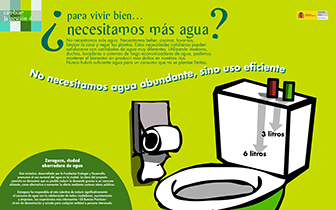 Panel 10- Para vivir bien... ¿necesitamos más agua?. ¿Son reales las necesidades de agua que tenemos diariamente o podríamos ahorrar mucho más...?
Panel 10- Para vivir bien... ¿necesitamos más agua?. ¿Son reales las necesidades de agua que tenemos diariamente o podríamos ahorrar mucho más...?
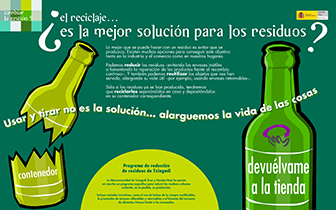 Panel 11- El reciclaje... ¿es la mejor solución para los residuos?. ¿Conoces las 3 R del reciclaje?, pues pasa y aprende.
Panel 11- El reciclaje... ¿es la mejor solución para los residuos?. ¿Conoces las 3 R del reciclaje?, pues pasa y aprende.
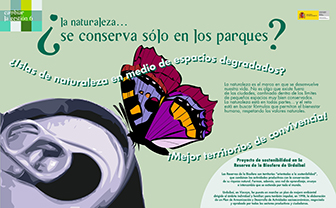 Panel 12- La naturaleza... ¿se conserva sólo en los parques?. ¿Respetamos la naturaleza en las ciudades como se merece?.
Panel 12- La naturaleza... ¿se conserva sólo en los parques?. ¿Respetamos la naturaleza en las ciudades como se merece?.
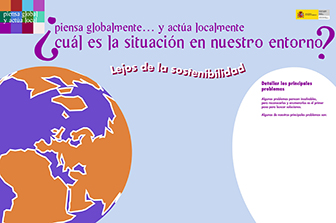 Panel 13- ¿Cuál es la situación en nuestro entorno?. Este panel espera que pienses y escribas algunos problemas del mundo actual.
Panel 13- ¿Cuál es la situación en nuestro entorno?. Este panel espera que pienses y escribas algunos problemas del mundo actual.
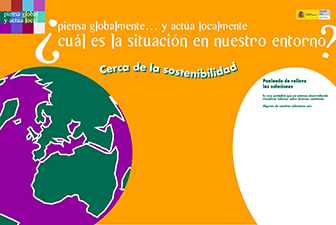 Panel 14- ¿Cuál es la situación de nuestro entorno?. No sólo existen cosas malas en nuestro mundo, ¿qué cosas buenas se te ocurren?.
Panel 14- ¿Cuál es la situación de nuestro entorno?. No sólo existen cosas malas en nuestro mundo, ¿qué cosas buenas se te ocurren?.
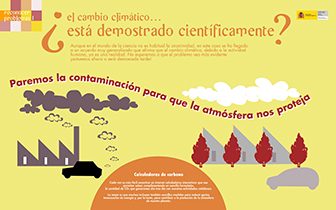 Panel 15- El cambio climático... ¿está demostrado científicamente?. Parece que sí, ¿a qué esperamos para hacer algo?.
Panel 15- El cambio climático... ¿está demostrado científicamente?. Parece que sí, ¿a qué esperamos para hacer algo?.
 Panel 16- El estilo de vida en los países ricos... ¿es exportable al resto del mundo?. Los países ricos estamos consumiendo por encima de las posibilidades del planeta, ¿podremos cambiar?.
Panel 16- El estilo de vida en los países ricos... ¿es exportable al resto del mundo?. Los países ricos estamos consumiendo por encima de las posibilidades del planeta, ¿podremos cambiar?.
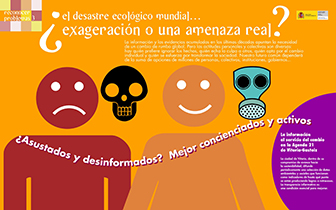 Panel 17- El desastre ecológico mundial... ¿exageración o una amenaza real?. ¿Hasta cuando vamos a seguir como estamos?, parece que tenemos que cambiar, ahora es tiempo de hacerlo.
Panel 17- El desastre ecológico mundial... ¿exageración o una amenaza real?. ¿Hasta cuando vamos a seguir como estamos?, parece que tenemos que cambiar, ahora es tiempo de hacerlo.
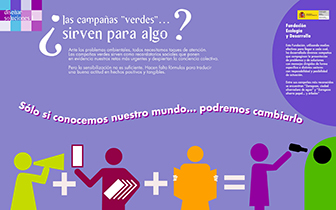 Panel 18- Las campañas "verdes"... ¿sirven para algo?. Sólo desde el conocimiento puede haber acción, ¿te apuntas a enseñar o a aprender?.
Panel 18- Las campañas "verdes"... ¿sirven para algo?. Sólo desde el conocimiento puede haber acción, ¿te apuntas a enseñar o a aprender?.
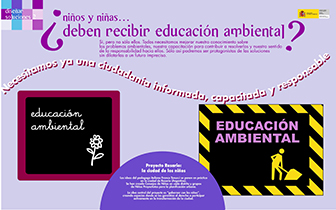 Panel 19- Niños y niñas... ¿deben recibir educación ambiental?. Parece estar claro que sí, pero ¿sólo ellos?.
Panel 19- Niños y niñas... ¿deben recibir educación ambiental?. Parece estar claro que sí, pero ¿sólo ellos?.
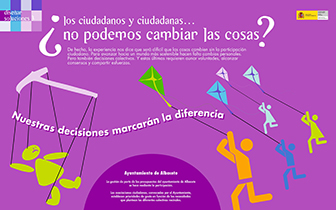 Panel 20- Los ciudadanos y ciudadanas... ¿no podemos cambiar las cosas?. Si queremos que se produzca el cambio, debe ser desde cada uno de nosotros.
Panel 20- Los ciudadanos y ciudadanas... ¿no podemos cambiar las cosas?. Si queremos que se produzca el cambio, debe ser desde cada uno de nosotros.
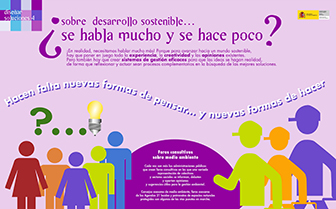 Panel 21- Sobre desarrollo sostenible... ¿se habla mucho y se hace poco?. De nuevo, hemos de ser todos los que demos las ideas para provocar el cambio, no ha de ser sólo tarea de unos pocos.
Panel 21- Sobre desarrollo sostenible... ¿se habla mucho y se hace poco?. De nuevo, hemos de ser todos los que demos las ideas para provocar el cambio, no ha de ser sólo tarea de unos pocos.
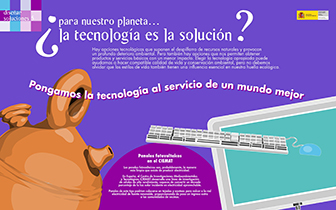 Panel 22- Para nuestro planeta... ¿la tecnología es la solución?. Hay muchas opciones tecnológicas para intentar solucionar problemas ambientales, ¿será posible adaptarlas a nuestra vida?.
Panel 22- Para nuestro planeta... ¿la tecnología es la solución?. Hay muchas opciones tecnológicas para intentar solucionar problemas ambientales, ¿será posible adaptarlas a nuestra vida?.
This page provides information on cookies we use: We use our own and third-party cookies to keep your session active, personalise your experience, and collect anonymous statistics about how you use this website. You can choose to accept all cookies or select which types you'd like to allow. To learn more about the cookies we use, read our Cookies Policy.
We use two types of cookies on this site. First, there are Functional Cookies, which are essential for the website to work properly. They store session data to make your experience smoother and more convenient. On the other hand, Analytical Cookies collect information about how you use the portal, without personal data, helping us provide a better and more tailored service.
Introduction to the Use of Cookies on the MITECO.gob.es Website
Cookies are small files that are stored on your device when you visit a webpage. They are essential tools that help provide many of the services available on the information society. Among other things, cookies allow a webpage to store and retrieve information about a user's browsing habits or their device. Based on this information, they can be used to recognise the user and enhance the service provided.
Types of Cookies
Depending on the entity that manages the domain from which the cookies are sent and processes the data, there are two types of cookies: first-party cookies and third-party cookies.
There is also a second classification based on how long the cookies remain stored in the user's browser: session cookies and persistent cookies.
Finally, cookies can also be classified into five types based on the purpose for which the data is processed: technical cookies, personalisation cookies, analytics cookies, advertising cookies, and behavioural advertising cookies.
For more information on this, you can refer to the Guide on the use of cookies from the Spanish Data Protection Agency.
Cookies used on the website
The web portal of the Ministry for Ecological Transition and the Demographic Challenge uses Adobe Analytics, an analytics tool that helps website and application owners understand how visitors interact with their content. Adobe Analytics uses a small number of cookies to collect data and generate usage statistics for websites. This information is sent anonymously and is not shared with third parties under any circumstances. You can choose to accept or reject these cookies, as they do not affect the portal’s functionality. However, they help provide valuable information that allows us to offer a better and more tailored service. For more information about Adobe Analytics cookies and privacy, please refer to the following links:
Additionally, pages featuring content from social network X will only set cookies if the user is logged into the X site. For more details on these cookies, please refer to the following link: Privacy on Social Network X
Finally, a technical cookie named MITECO-compliance is stored, which is a first-party, technical, and session-based cookie. It manages user consent for the use of cookies on the website, remembering which users have accepted them and which have not, ensuring that those who have accepted are not shown cookie consent messages at the top of the page. This cookie is essential for the proper functioning of the portal.
Cookies Policy Acceptance / Rejection
The Ministry for Ecological Transition and the Demographic Challenge gives you the option to accept or reject cookies that are not essential for the portal's operation. Upon accessing the portal, a message will be displayed in the centre of the page with information about the cookie policy and the following options:
· Firefox
· Chrome
· Safari
